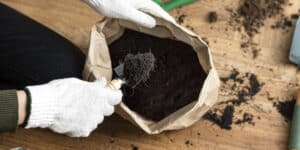By: Shelby McCullough| Published: March 6, 2023

Do you know what’s in your soil? If you’ve never thought about it, your trees and plants could be missing vital nutrients that they need to grow healthy and strong. Poor-quality soil is also a haven for pests and weeds, and once they’ve set in, getting rid of them can be a real challenge!
If you’re wondering how to keep soil healthy, these tips from Chuluota’s trusted tree service can help. Learn how to keep your garden looking great for years to come by “digging” deep into soil health.
The Importance of Healthy Soil for Beautiful Plants
On the surface, soil doesn’t seem very impressive, but looks can be deceiving. Soil performs five important functions for your plants:
- Storing and cycling nutrients, such as nitrogen, carbon, and phosphorus
- Filtering and immobilizing pollutants
- Providing protection for plant roots
- Supporting diversity of animal and plant life
- Regulating water flow
What Is the Best Soil for Plants?
Plants do best in loamy soil, which contains a combination of sand, silt, and clay. Sandy soil drains too quickly, which means you’ll need to water more often. If the soil structure contains too much clay, moisture drains slowly. Excess moisture can cause roots to rot, and some plants might not be able to grow at all.
Plants and trees also need a variety of minerals and nutrients, which serve as soil food that supports the health of your yard or garden. The three most important nutrients for healthy plants are nitrogen, phosphorus, and potassium. Secondary macronutrients are those that plants require in smaller amounts, including sulfur, copper, cobalt, iron, zinc, and manganese.
Synthetic fertilizers boost soil nutrition quickly, but you might want to consider slower-acting organic options, such as chicken manure, fish emulsion, earthworm castings, and bone meal.
Plants need soil with the right pH, too. Some plants grow best in acidic soil, while others prefer more alkaline environments, so research what your particular plants need. If your soil’s pH is wrong for the plants in your yard, they’ll have trouble absorbing nutrients, resulting in slow, spindly growth.
Symptoms of Unhealthy Soil
How can you tell if your soil needs help? Signs of soil nutrient and pH deficiencies to watch for in plants include:
- Small, stunted leaves
- Yellowing or browning
- Leaves develop a red or purple color
- Leaves look burnt or crispy
- Small or no flower blossoms
- Poor yield for fruits and vegetables
Without testing, knowing how to keep soil healthy is just a guessing game. You can send a soil sample to your county’s soil testing department or local university’s agriculture extension. In a few weeks or less, you’ll receive detailed results on your soil health to help you know what to improve.
The Benefits of Mulching for Soil Health
Mulches keep your soil healthy in a number of ways, such as:
- Regulating temperature extremes
- Retaining soil moisture and controlling drainage
- Shading soil from the sun
- Adding nutrients through decomposition
- Preventing weed emergence
You can opt for organic or synthetic mulch, depending on the look you want to achieve. Some gardeners like synthetic mulches because they last for a very long time. Organic mulches decompose and break down naturally, so you’ll need to add more regularly.
Synthetic mulches include:
- Gravel
- Decorative stone
- Rubber chunks
- Landscape fabric
Still, many people prefer organic mulch because it’s usually inexpensive and environmentally friendly.
Organic mulches include:
- Leaves
- Grass clippings
- Wood chips
- Pine needles
- Straw
Whether you choose organic or synthetic mulch, mid-spring is an ideal time to add mulch to your garden. Apply a two- to four-inch layer of mulch evenly over the soil, and be sure to keep mulch three to five inches away from the base of tree and shrub trunks. Mulch shouldn’t touch tree trunks because it can cause plant decline or death.
Prevent Soil Compaction
Soil compaction makes it difficult for plants to get the water, air, and nutrients that they need to grow. Water can also pool in compacted areas, which causes root rot and attracts moisture-loving pests such as mosquitoes.
To avoid compaction, don’t step or stand on the soil around your plants. It can be helpful to put your plants in narrow rows instead of wide beds, which gives you more room to tend the garden without disturbing the soil around the plants’ stalks and roots. You should also make sure to keep heavy vehicles and work equipment off the lawn.
Tilling may be necessary to break up hard or rocky soil, but it can cause compaction, too. To avoid the need for excess tilling, mix compost or other organic matter into the soil when you first prepare the garden bed.
Avoid Pesticide Use in Your Yard
Chemical pesticides offer a quick solution to eliminating pests and diseases that attack your plants. Unfortunately, these toxic chemicals often do more harm than good. Pesticides can kill beneficial insects, especially pollinators such as bees and butterflies. They’re also toxic to earthworms, which are a vital part of your soil’s ecosystem.
Additionally, pesticides can remain in the soil for a long time. Plant roots absorb these chemicals, which is bad news if you’re growing an edible garden full of fruits and vegetables.
If insects are damaging your plants, opt for a natural solution such as horticultural oil, neem oil, or diatomaceous earth powder. Control small pests, such as aphids, by regularly spraying plants with cool water or wiping leaves with a damp cloth. You can remove slugs, beetles, and other large insects by hand and dispose of them in a bowl of soapy water.
By avoiding pesticides, you’ll create an environment where dragonflies, ladybugs, and other predator insects thrive. These predators feast on unwanted pests, allowing your garden to flourish naturally.
Building Better Soil with McCullough Tree Service
If you’d like to learn more about essential tree nutrients and how to keep soil healthy, call McCullough Tree Service at (407) 734-5854 today! Our tree experts are ready to help with any questions or concerns about the health of your lawn.

